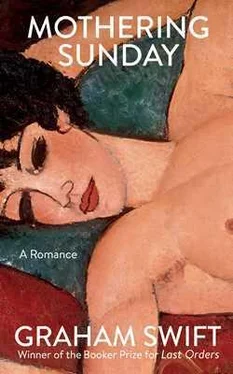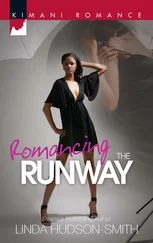And how, after all, could you admit to such things in a public interview (sprightly as some of her interviews could be): I wandered naked round a house that wasn’t even mine, that I’d never even entered before. And how did I get to be doing that? Well there was a whole story there, a story she’d sworn to herself never to tell. Nor had she. Nor would she.
Though here she was, look, a storyteller by trade.
It was Mothering Sunday 1924. A different thing from the nonsense they call Mother’s Day now. And she had no mother, you see.
She was raised in an orphanage, then put into service. Another phrase you don’t hear often these days, but another ‘start in life’ she would recommend to the would-be writer (though it was hardly to be recommended in 1980 or 1990). Since it made you an occupational observer of life, it put you on the outside looking in. Since those who served served, and those who were being served — lived. Though sometimes, to be honest, it felt at the time entirely the other way round. It was the servants who lived, and a hard life they had of it, and the ones who were served who seemed not to know exactly what to do with their lives. Proper lost souls, in fact, some of them. .
She’d been put into service at fourteen. Two years later, in 1917, she’d gone to Beechwood House in Berkshire. She’d been ‘taken in’ once again, you might say, by Mr and Mrs Niven, whose family had been recently reduced by the loss of two sons, and who required in those hard-pressed wartime years only a novice maid (meaning perhaps simply cheap) in addition to their existing cook.
Out of motives best known to themselves — though not so difficult to fathom perhaps — they had considered and chosen an orphan, and then discovered that the poor forlorn thing was not so lacking in spark or gumption at all. It turned out she could read, more than many maids could, more than the word ‘Brasso’ on a tin, and could write more than a shopping list, and could do sums.
‘Can you tell me, Jane, what are three and six plus seven and six?’
‘Eleven shillings, Mr Niven, sir.’
She was half educated.
It even emerged one day that she wanted to read books. Books! And instead of its seeming a damned cheek, it had only stirred further the charitable urges already present in the house. It had only touched some capacity for paternal leniency in Mr Niven that this orphan girl — this Fairchild — should be allowed to borrow books from his library.
When he learned which kind of book she preferred he might have gently but firmly protested, but perhaps her preference only brought out the leniency all the more. Mr Niven sometimes disappeared into the library himself. It was what, she sometimes thought, libraries were for: for men to disappear into and be important in, even though they had disappeared. She sometimes thought Mr Niven went into the library to cry.
The leniency extended to her own occasional ‘disappearances’. Mr and Mrs Niven had no complaints about her work generally — the opposite — but she could now and then be oddly absent — beyond, that is, her designated days and half-days off. As when she seemed to take for ever over simple shopping errands. Or those times she said she had a puncture, or her chain had come off again (there seemed to be a curse on the Second Bicycle) and she’d had to seek the kind help of other passing cyclists. But then there were times — true, usually in the quieter stretches of the day — when she was simply not to be found.
Though now perhaps these absences could be explained. She had snatched a moment in her room, not, as once fondly supposed, to bemoan in private her sad orphan’s lot, but to read a book. You could hardly allow her to borrow books and then not allow her at least some time to read them. And the house was not any more, let’s face it, as in the old days, a firmly governed, a strictly regimented house. Look where regimentation had got the world.
Had Mr Niven, had either of them, ever wondered, guessed?
Oh yes, she would say, the glint in her eye, she was lucky to have been born with nothing to her name. With not even a name, in fact. Or the real date of her birth. So she was not only nameless, but ageless. And her eighty-year-old face would bloom.
The first of May was the date of birth that had been accorded to her, by rough approximation and perhaps because it was a nice date, just as Jane Fairchild was a nice name. Some mothers, apparently, left a little note, inside the bundle, with just a date of birth and a name. Only the first name. The commoner the better. No one ever deposited a Laetitia. And, if you thought about it, the name must have only been a thought anyway. And wasn’t any name just a thought? Why was a tree called a tree?
She might even have liked to be called Jane Bundle.
And did it matter if you marked your birthday on the wrong day? If it had really been the 25th of April, though you never knew. The wrong day became the right day. This was the great truth of life, that fact and fiction were always merging, interchanging. And if you were a maid you weren’t given much leisure to mark your birthday anyway — if anyone even knew it. You weren’t given the day off. And being a maid was a little like being an orphan, since you lived in someone else’s house, you didn’t have a home of your own to go to.
Except on Mothering Sunday. When you did get the day off, to go home to your family. Which would always put her at a bit of a loss. What to do, what to do with herself on Mothering Sunday? She could hardly go looking for her mother.
Though what would she have done with herself anyway, with her life, if she hadn’t been a maid? And she supposed — the furrowed face would bloom again — that it was a very common human predicament. To be at a loss, not to know what to do with yourself.
‘My years as a maid’, she would call them, ‘my maid’s years’, never adding, ‘but not for long my maidenly ones’. ‘My years in service’. It was hard to think now of a time when half the world was ‘in service’. She was born in 1901—at least the year must have been right — and she would grow up to become a maid, which anyone might have predicted. But to become a writer — no one could have predicted that. Not even the kindly committee at the orphanage who had reconceived her as Jane Fairchild, born on the first of May. And, least of all perhaps, her mother.
When she was asked, in the interviews, to describe the atmosphere of those wartime years (meaning, of course, the First War), she would say that it was so long ago now and so like another world that trying to remember it was a bit like — writing a novel. Had she really been alive then? But if she were honest she would add that she’d been not unaware of it, of course — all that accumulated loss and grief. How could anyone be unaware of it? Every week she dusted two rooms where everything was to remain ‘just as it was’. You went in, took a little breath perhaps, and got on with it.
But she had never known them, the boys who’d had those rooms, and what she mainly thought was: A whole room, full of furniture, each . And if you had yourself been comprehensively bereaved at birth — and that was her situation, wasn’t it? — how could you share in all that stuff, how could you have anything left over for it? The war wasn’t her fault, was it? And, yes, you might say she was lucky, not to have a brother or father, let alone, at that age, a husband to think about. And, yes, you might say it was her good luck to have been raised in a good orphanage, they weren’t all evil places rife with abuse. Her mother, whoever she was, had perhaps had some discernment.
So she’d received a rudimentary education when many who had parents didn’t. When many who were packed off to the trenches didn’t. She’d been put into service at fourteen with a relatively advanced ability to read and write and — free from all family ties — with perhaps more than a usual eagerness for life.
Читать дальше












